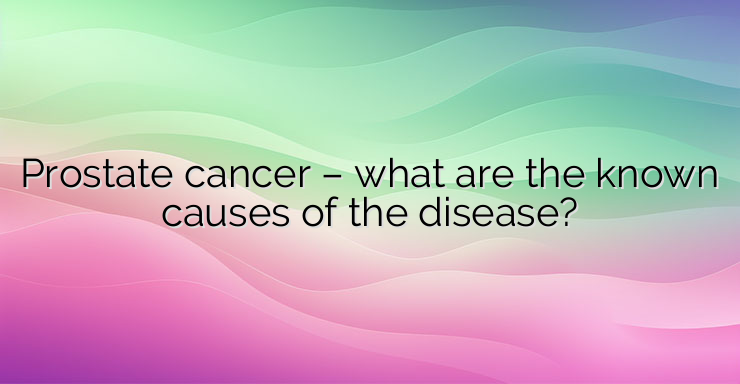Chemical exposure Exposure to chemicals in some occupations has been linked to the development of prostate cancer. Such substances include: Cadmium – the risk of developing prostate cancer associated with cadmium exposure appears to be increased with zinc deficiency in the diet; Herbicides – more recent research has shown a link between exposure to these chemicals and prostate cancer. There is at least a 50% greater risk of developing prostate cancer with exposure to the toxins, and the cancers that do occur tend to be more aggressive and more likely to metastasize; Pesticides – men who apply pesticides or work in pesticide production may have an increased risk of prostate cancer. This increased risk, according to studies, is mainly observed in men who also have a family history of the disease (case in the family); Smoke – there are a number of different compounds in smoke that may contribute to an increased risk of prostate cancer in firefighters Some environmental factors that have not yet been identified also play a role in the development of prostate cancer. It should be noted that men who have a brother with prostate cancer have a higher risk of developing the disease than men who have a father with the disease (both fathers and brothers are considered first-degree relatives). This may mean that the increased risk for a patient with an affected brother versus an affected father is due to environmental factors. Vitamin D deficiency and sun exposure Vitamin D acts as a hormone in the body and is produced in the skin when exposed to ultraviolet light from the sun. It is now known that men who live in northern regions are at increased risk of the disease than men in southern latitudes, and some experts believe that this increased risk is related to vitamin D deficiency. Other studies have shown that high serum Vitamin D levels may reduce the risk of aggressive prostate cancer. Fortunately, vitamin D levels can be tested with a simple blood test, and men can talk to their doctors about taking supplements if needed. Sexual activity It used to be thought that men who were more sexually active (having more ejaculations per month) were at greater risk of prostate cancer. This theory was based on the proposition that such men are at increased risk of sexually transmitted diseases, which can cause inflammation of the prostate (prostatitis) and therefore lead to cancer, or that these men have higher levels of of testosterone (testosterone can ‘fuel’ the growth of prostate cancer). This myth has been debunked in several large studies, which found that men who had more ejaculations per month (21 in this particular study) appeared to have a significantly lower risk of developing prostate cancer than those who had fewer (four to seven or less).In colon cancer, less frequent bowel movements are associated with an increased risk of the disease, possibly because toxins in the stool are in contact with the lining of the bowel for a longer period of time. The same mechanism may be at work in prostate cancer, where fewer ejaculations could result in carcinogens being in longer contact with prostate tissue. Prostatitis In some studies, chronic prostatitis resulting from sexually transmitted infections has been associated with an increased risk of prostate cancer. However, other studies have shown conflicting results and the research is currently inconclusive. Factors that have been mistakenly linked to prostate cancer There is a great deal of misinformation about other potential risk factors for prostate cancer, but it is important to distinguish between fact and myth: Vasectomy – the possibility that vasectomy is linked to prostate cancer is has been debated for some time, although more recent studies have found no link between vasectomy and the occurrence of prostate cancer; Immunosuppression – having a compromised immune system is not associated with an increased risk of prostate cancer, but the prostate cancer that does occur may be more aggressive; Obesity – Men who are overweight or obese do not appear to have a greater risk of developing prostate cancer, but an increased body mass index is associated with tumors that are more aggressive and more difficult to treat. Bibliography: American Cancer Society. Prostate Cancer Risk Factors American Cancer Society. How family history affects prostate cancer risk Krstev S, Knutsson A. Occupational risk factors for prostate cancer: a meta-analysis Verywell Health. Causes and Risk Factors of Prostate Cancercan be more aggressive; Obesity – Men who are overweight or obese do not appear to have a greater risk of developing prostate cancer, but an increased body mass index is associated with tumors that are more aggressive and more difficult to treat. Bibliography: American Cancer Society. Prostate Cancer Risk Factors American Cancer Society. How family history affects prostate cancer risk Krstev S, Knutsson A. Occupational risk factors for prostate cancer: a meta-analysis Verywell Health. Causes and Risk Factors of Prostate Cancercan be more aggressive; Obesity – Men who are overweight or obese do not appear to have a greater risk of developing prostate cancer, but an increased body mass index is associated with tumors that are more aggressive and more difficult to treat. Bibliography: American Cancer Society. Prostate Cancer Risk Factors American Cancer Society. How family history affects prostate cancer risk Krstev S, Knutsson A. Occupational risk factors for prostate cancer: a meta-analysis Verywell Health. Causes and Risk Factors of Prostate Cancer


Leave a Reply